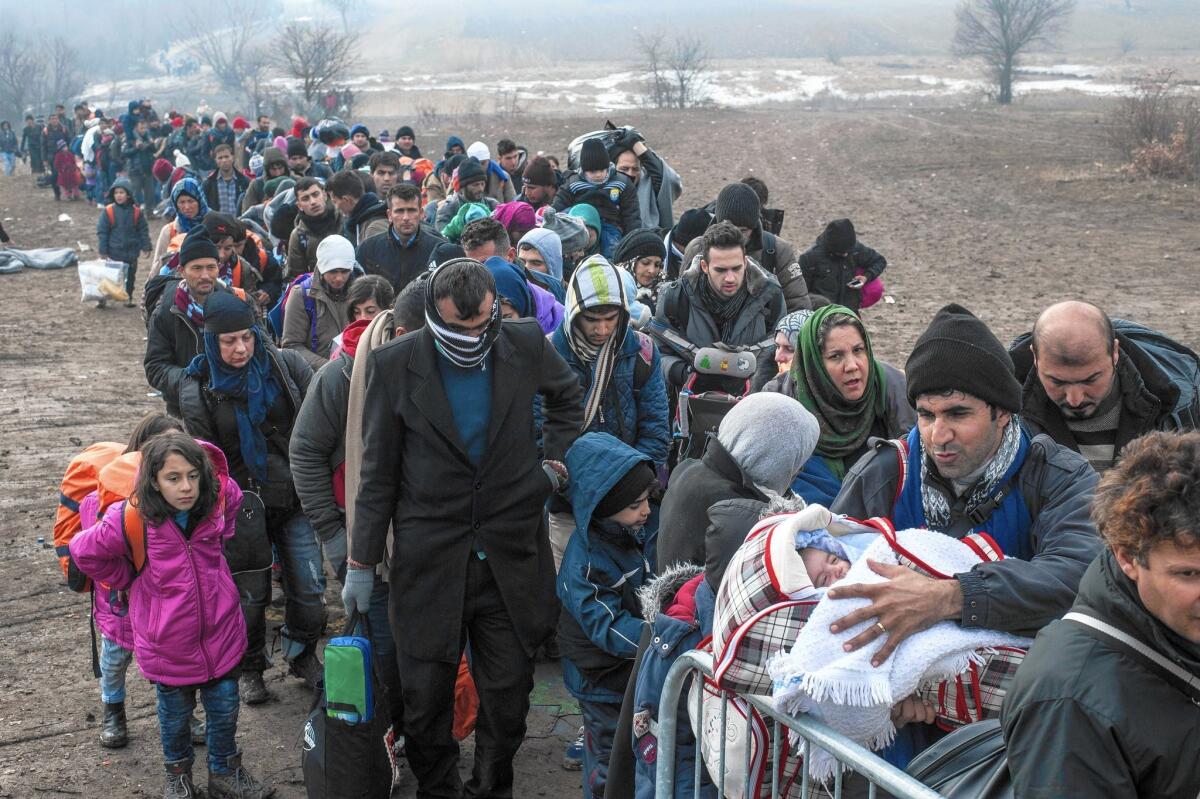Europeans remove welcome mat for migrants

- Share via
Reporting from LONDON — European leaders faced with overwhelming numbers of migrants are tightening their border controls and toughening their rhetoric in an effort to manage the crush of people.
In Sweden, Interior Minister Anders Ygeman said last week that up 80,000 migrants who applied for asylum in Sweden last year after fleeing poverty or their war-torn homelands in the Middle East or North Africa could face deportation.
In Denmark, legislators passed a bill designed to discourage people from seeking asylum. It included a controversial measure allowing authorities to seize valuables worth more than $1,450 if authorities felt the items could help contribute to the cost of their reception. Sentimental items such as wedding rings are exempt.
The move in Denmark was vehemently criticized by human rights groups and United Nations Secretary-General Ban Ki-moon. Many people likened the measure to the confiscation of possessions from Jews by the Nazis during the Holocaust.
The Danish bill also increased the amount of time before refugees could apply for family reunification from one to three years. The practice allows for a family member who has successfully migrated or been granted asylum to request that the remainder of the family join him or her.
Observers said harder-line stances from European Union countries, some of whom were previously openly welcoming of refugees, had in many cases been born out of necessity.
“Some EU member states are really struggling to find accommodation for the new arrivals,” said Elizabeth Collett, director of the Migration Policy Institute Europe. “It’s a system under pressure.”
In Sweden, approximately 163,000 migrants applied for asylum in 2015, more relative to its population size of 9.8 million than any other European country. It has put excessive strain on services, and the interior minister admitted his country had a “big challenge” ahead.
“We will need to use more resources for this and we must have better cooperation between authorities,” he said in an interview Wednesday with Stockholm’s daily newspaper Dagens Industri.
European nations also have a political incentive for introducing bold and seemingly anti-migrant measures: namely, to get other EU countries to share the burden and deter other people contemplating the journey.
“They are trying to send a tougher message internationally to all potential arrivals that it’s not going to be as easy as you think it is,” Collett said. “In some countries there’s [also] a lot of rhetoric like this to demonstrate to the public they have got a handle on things.”
European leaders have been at loggerheads for months over how to deal with the seemingly never-ending flow of migrants, and there appears to be little sign of breakthrough.
Greece was criticized by the European Commission last week for having “seriously neglected” its obligation to control the external border of Europe’s so-called Schengen zone — the passport-free area. The Greek government hit back at what it called the EU’s “blame games” and criticized the lack of a coherent response.
Overall, more than 1 million refugees and migrants are believed to have traveled into Europe last year. Cold temperatures and perilous winter weather have made the crossing even more dangerous but do not appear to have dramatically reduced the number of people from attempting the crossing.
Since the start of the year, an estimated 46,000 migrants fleeing poverty have arrived in Europe, according to the United Nations.
In the absence of any cohesive strategy, many European countries feel they have no option other than to introduce their own rules to control the flow of people.
Sweden recently introduced identity checks for travelers coming from Denmark and also made it harder for businesses to hire immigrants who lack official documentation.
There have also been calls for greater security checks as well as an investigation into overcrowding at holding facilities after a 22-year-old employee at an asylum center near Gothenburg was stabbed to death. A 15-year-old who was staying at the center for 14- to 17-year-old unaccompanied youths was arrested.
Madelaine Seidlitz, senior legal advisor on refugees, migrants and international law at Amnesty International, warned that such piecemeal measures can have dangerous consequences.
Join the conversation on Facebook >>
“We do agree with the Swedish government on the need for all EU countries to act according to mutual obligations, but we see that these kinds of statements and policies contribute to the domino effect that we see all over Europe.”
Germany has toughened its asylum rules to stem the flow of migrants through its borders, but also to get those more resistant countries to do their part. Chancellor Angela Merkel had previously been one of the European leaders most vocally welcoming to refugees and said there would be no limit on the numbers taken in.
Seidlitz said the situation regarding policy toward asylum seekers and refugees in Europe had “never been so dark.”
And none of these measures appears to have yet achieved the most critical aim: preventing the loss of life. On Saturday, at least 37 people drowned when their boat struck rocks and capsized off Turkey, officials said. Among them were several babies and young children.
“Leaders don’t want to go through another year of high levels [of migration] when they don’t know if security can handle it, [or if] their infrastructure can handle it,” Collett said.
Boyle is a special correspondent.
ALSO
The story of a wife who lured an O.C. fugitive out of Iran
More Korean seniors are stepping up to donate their bodies to science
With no Trump onstage, GOP hopefuls make sounds Californians seem to like
More to Read
Sign up for Essential California
The most important California stories and recommendations in your inbox every morning.
You may occasionally receive promotional content from the Los Angeles Times.












